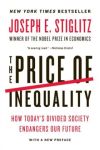America is becoming increasingly unequal. This comes at a great price: lowered life expectancy, greater actual division (e.g., the rise of gated communities), and a darker future. Our government policies greatly add to this growing inequality. And, those at the top have found increasingly effective ways to shape these government policies to their advantage. To “fix this” will take a while, and be very difficult to pull off.
 That is my paragraph summary of The Price of Inequality: How Today’s Divided Society Endangers our Future by Joseph Stiglitz. I will present my synopsis of this book today at the Urban Engagement Book Club.
That is my paragraph summary of The Price of Inequality: How Today’s Divided Society Endangers our Future by Joseph Stiglitz. I will present my synopsis of this book today at the Urban Engagement Book Club.
Here are some of the numbers (from the book):
As even the typically “free market”–oriented Economist observed, “In America the share of national income going to the top .01% (some 16,000 families) has risen from just over 1% in 1980 to almost 5% now—an even bigger slice than the top .01% got in the Gilded Age.
All of the wealth accumulation in this country has gone to the top. If the bottom had shared equally in America’s increase in wealth, its wealth over the past two decades would have gone up by some 75 percent.
…those at the bottom suffered even worse than those in the middle. Before the crisis, the average wealth of the bottom fourth was a negative $2,300. After the crisis, it had fallen sixfold, to a negative $12,800.
Mr. Stiglitz puts plenty of the blame/credit/explanation for this rising inequality on “rent seeking.” Again, from the book:
rent seeking — getting income not as a reward to creating wealth but by grabbing a larger share of the wealth that would otherwise have been produced without their effort.
Those at the top have learned how to suck out money from the rest in ways that the rest are hardly aware of—that is their true innovation.
Inequality is written about seemingly everywhere we look. But, it continues to rise. This book presents a comprehensive look at the problem. It does offer solutions, most of which have to do with changes in government policy. They make sense. But, I’m not sure we are living in a climate that makes such changes very likely.
This book is worth reading.
——————–
You might want to check out the New York Times review of the book by Thomas B. Edsall: Separate and Unequal. Here are two key paragraphs from his review:
Joseph E. Stiglitz’s new book, “The Price of Inequality,” is the single most comprehensive counterargument to both Democratic neoliberalism and Republican laissez-faire theories. While credible economists running the gamut from center right to center left describe our bleak present as the result of seemingly unstoppable developments — globalization and automation, a self-replicating establishment built on “meritocratic” competition, the debt-driven collapse of 2008 — Stiglitz stands apart in his defiant rejection of such notions of inevitability. He seeks to shift the terms of the debate.
Stiglitz may prove most prescient when he warns of a society governed by “rules of the game that weaken the bargaining strength of workers vis-à-vis capital.” At present, he says,“the dearth of jobs and the asymmetries in globalization have created competition for jobs in which workers have lost and the owners of capital have won.” We are becoming a country “in which the rich live in gated communities, send their children to expensive schools and have access to first-rate medical care. Meanwhile, the rest live in a world marked by insecurity, at best mediocre education and in effect rationed health care.” Except for a brief period in 2008-9, when the stock market decline hit the wealthy the hardest, the trends would seem to be moving toward Stiglitz’s pessimistic vision of the future, with little prospect of change…
